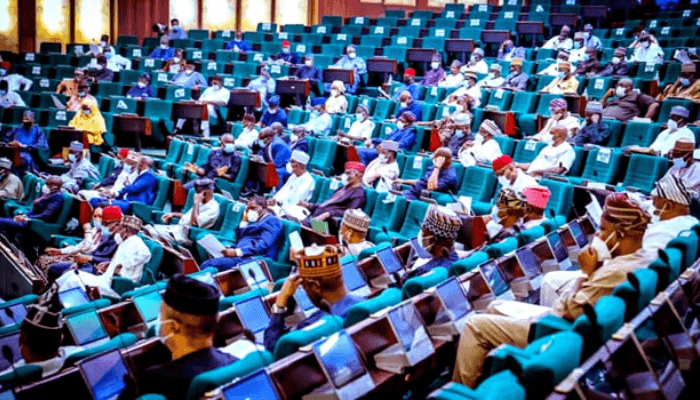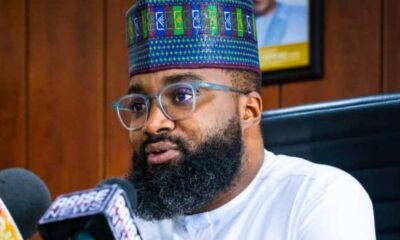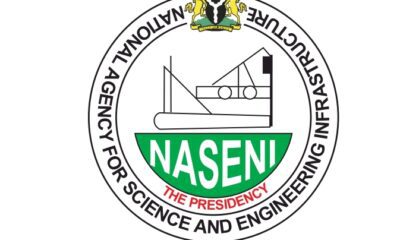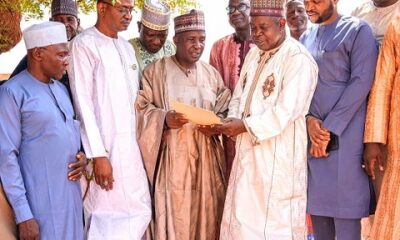News
Kebbi Governor urges NASENI trainees to become agri-billionaires
…As agency flags off nationwide skills’ acquisition programme for youths
By Ogaga Ariemu
The Governor of Kebbi State, Sen. Abubakar Bagudo, has charged the 100 trainees of the National Agency for Science and Engineering Infrastructure (NASENI) Skills Acquisition Training and Youth Empowerment to determine to become billionaires through agriculture.
He made this call at the opening ceremony of the skills acquisition training themed “Modern farming methods using improved farming implements in Kebbi State,” held on Monday in Birnin Kebbi, the state capital.
The five-day training programme which runs from 15 – 19 marked the flag-off of the nationwide skills acquisition training for youths in the six-geopolitical zones of Nigeria with a target of 100 trainees in each zone.
“We are actually very lucky in Nigeria because other countries are facing food shortages but we are not. Yes, we might be experiencing higher prices, but it is an invitation to our youths, those young men and women who want to be billionaires. What higher prices tell you is that there are opportunities. Be the billionaires you want to be. Produce, don’t buy. Sell.
“So, to the trainees here, please, make it an objective today that you are determined to be billionaires out of agriculture. That you are determined to make success out of this training. How do you achieve that? By being humble. Don’t assume you know what you don’t. Make sure you understand. From today ask yourself how someone around the world has become a billionaire out of agriculture. The more you interrogate yourselves, the more you ask questions during this training that will prepare you for that future. That is what we pray for you to achieve so that you will serve as an example to others,” he charged.
Bagudo, who underscored President Muhammadu Buhari’s belief that Nigeria’s economy can be transformed through agriculture, stressed that it can only happen if the right attention is paid to agriculture, which he described as “science.”
He said, “We can only transform the nation through agriculture when we do the right thing [by] fund[ing] and support[ing] agriculture adequately and, most importantly, putting science and engineering into agriculture adequately.
“That we are here today as part of a training programme by NASENI encapsulates all of that. Today we are here to appreciate that agriculture is science. The seed we put underground is science. If you don’t know it, understand it or use the correct one you get nothing. How you farm, plant, process, use technology is all science and engineering. The less you do, the less outcome you get.
“So, over the last seven years we have seen an increase in yield, output because of this belief that President Muhammadu Buhari has planted in Nigerians to believe in themselves, the institutions and ensure that our best brains are going into where the problems are. Today, NASENI an institution that hosts our best brains is, among other things, helping us to ensure we do much better and quicker in agriculture. I believe we will because, as I said, agriculture is science,” he added.
Earlier, in his welcome remarks, the executive vice chairman of NASENI, Prof. Mohammed Haruna explained that President Muhammadu Buhari has approved the skills acquisition training in all the geopolitical zones of the country.
According to him, each train is appropriate to the areas of operation and economic activities of the zone. In the north west zone, Kebbi, known for its farming, is the core target for its training.
“The technologies we are bringing and teaching and ensuring that the farmers have the implement and all they need as a startup pack to operate successfully include equipment for cultivation, weeding, plantation, processing and all other post-harvest activities, including food preservation to guarantee exportation of the food product. But, in order to consolidate and sustain the success achieved by the Buhari administration in agriculture, the president has approved six zonal agricultural equipment and machinery development institutes for each of the six geopolitical zone. The one for the northwest is approved to be located in Kebbi State. In addition, a skill development centre is equally approved for this state,” he said.
The NASENI boss posited that impact of modern farming techniques and mechanised farming technology cannot be overemphasised.
“We have said over and over again that we cannot continue in this age to use animal power or to continue using hard labour in what should be very attractive activity or exercise in improve food production.
“We cannot continue to do everything manually, including processing and hard labour with consequent output of low crop yield in one farming season limited to a year, instead of multi-crop production. NASENI has, therefore, with the approval and directive of President Muhammadu Buhari, acquired skill-acquiring technologies from Czech Republic and Jordan to domesticate, enhance and improve yields, as well as guarantee food security,” he stated.
Haruna added that the training is, thus, in line with expanding and guaranteeing sustainability of the success already achieved by this administration in agricultural development and technology.
He urged the 100 participants (who are practicing farmers carefully selected from all the 21 LGAs of the state) to pay close attention during the trainings and to go back home and use the technology acquired to teach others for the benefit of the nation.
In his remarks, the Minister of Justice and Attorney General of the Federation Abubakar Malami (SAN), said the training will provide the requisite support and direction towards achieving the objectives of the Buhari’s administration in skills development, youth empowerment and agricultural revolution as well as food security in the country.
“I understand from the organisers that this training aims at addressing issues regarding unemployment, reduction of youth restiveness, youth empowerment for self-sustenance agriculture development, food security and overall national development,” Malami said.
In his remarks, the All Progressives Congress (APC) governorship candidate, Dr. Nasiru Idris, posited that agriculture has the capacity to help in poverty reduction and value addition that relates to other sectors of the economy.
“Nigeria’s promise for a better future lies in agriculture and our youths must form the bedrock of that promise. This training, I believe, is a deliberate effort to entice our youths to embrace agriculture. There is no doubt that agriculture is the largest contributor to our nation’s gross domestic product and remains the bedrock of our economy. It must be encouraged, promoted, supported to take prime position in our economy. We have accepted that our economy can be best driven by our youths.
“With Kebbi State as one of the best producers of rice, maize, millet and wheat in the country, training our youths on how to use improved farming implements will definitely help to boost our economy through enhanced productivity,” he added.
In his remarks, the vice chancellor, Usam Danfodiyo University, Sokoto, Prof. Lawal Bilbis, lauded NASENI for being Nigeria’s springboard for industrial revolution.
“If Nigeria is to develop into the next industrial revolution, NASENI will be the springboard for that. NASENI reminds us of China and India that needed springboards like NASENI to spearhead its development,” he stated.
Speaking on behalf of the participants, Ashiru Adamu, thanked President Buhari, NASENI and the Kebbi State government for the privilege to be trained in modern farming methods.
“The farming system that the president is focusing on is very germane because food security is a topical and important subject. A hungry nation is an angry nation.
“This training will help us farm what we will utilise across the country and also have the ability to export our products,” he added.
News
Tinubu targets increased gas production, unveils plants in Delta, Imo


President Bola Tinubu will commission three critical gas infrastructure projects undertaken by the Nigerian National Petroleum Company Limited and its partners.
They are the AHL Gas Processing Plant 2 in Delta State, the ANOH Gas Processing Plant, and the ANOH-OB3 CTMS Gas Pipeline Projects in Imo State. The gas projects have a combined estimated output of 1,400 million standard cubic feet per day.
Special Adviser to the President on Media and Publicity, Ajuri Ngelale, disclosed this in a statement he signed Friday titled ‘President Tinubu to commission critical gas infrastructure projects.’
“The projects support the federal government’s effort to grow value from the nation’s gas assets while eliminating gas flaring…and deepen domestic gas supply as a critical enabler for economic prosperity,” said Ngelale.
The AHL Gas Processing Plant 2 is an expansion to the Kwale Gas Processing Plant, which currently supplies about 130MMscf/d of gas to the domestic market.
The processing plant is designed to process 200MMscf/d of rich gas and deliver lean gas through the OB3 Gas Pipeline. However, the facility already injecting gas is scheduled to ramp up to 180mmscfd by the end of May.
Ngelale said this additional gas supply will “support further rapid industrialisation of Nigeria” and also “produce about 160,000 MTPA of Propane and 100,000 MTPA of Butane, which will reduce the dependency on LPG Imports.”
The AHL Gas Plant is being developed by AHL Limited, an incorporated Joint Venture owned by NNPC Limited and SEEPCO.
Meanwhile, the ANOH gas plant is an integrated 300MMscf/d capacity gas processing plant designed to process non-associated gas from the Assa North-Ohaji South field in Imo State.
The plant will produce dry gas, condensate, and LPG. The gas from the ANOH plant will significantly increase the domestic gas supply, leading to increased power generation and accelerated industrialisation.
The ANOH Gas Plant is being developed by ANOH Gas Processing Company, an incorporated Joint Venture owned by NNPC Limited and Seplat Energy Plc on a 50-50 basis.
With the facility mechanically completed in December 2023, the NNPC says it is finalising pre-commissioning activities.
Third is the ANOH-OB3 CTMS Gas Pipeline Project, which the Presidency said involves the engineering, procurement, and construction of 36”x23.3km ANOH-OB3 Project.
“The Transmission Gas Pipeline will evacuate dry gas from the Assa North-Ohaji South primary treatment facility to the OB3 Custody Transfer Metering Station for delivery into the OB3 pipeline system,” read the statement.
About 600MMscf/d is estimated to be available from two separate 2 x 300MMscf/d capacity gas processing production trains from AGPC & SPDC JV.
The 23.3km Anoh-OB3 PPL is scheduled for mechanical completion by May 15, 2024.
When commissioned, the projects will increase gas supply to the domestic market by approximately 500mmscf/d, creating a better investment climate and promoting balanced economic growth cumulatively, the Presidential Spokesman affirmed
News
House of Reps to review laws, practices restricting press freedom


The House of Representatives said on Friday that it would review the laws and practices restricting press freedom and the ability of the media to carry out its constitutional role in the country.
Rep. Akin Rotimi, Chairman, House Committee on Media and Public Affairs, said this while delivering a keynote address, to mark the 2024 World Press Freedom Day organised by the Konrad Adenauer Stiftung, Nigeria.
Rotimi said the legislature would prepare the ground for journalists to operate without any hindrance provided they adhere to the tenets of their profession.
“We will enhance good governance practices, transparency and
accountability through media chats, public hearings, town hall meetings, etc., amongst other scheduled legislative actions in Agenda 6,” he said.
The International Press Freedom Day, celebrated every May 3, is a day of reflection among media professionals and stakeholders on issues of press freedom and professional ethics.
Rotimi said that the 10th House of Representatives led by Speaker Tajudeen Abbas, had resolved to work with the media to ensure a successful running of the present government.
He said that the 1999 Constitution of the Federal Republic of Nigeria (as amended) conferred on the press a critical role as contained in Section 22 regarding obligations of the mass media.
“The role states that the press, radio, television and other agencies of the mass media shall at all times be free to uphold the fundamental objectives in this chapter and uphold the responsibility and accountability of the government to the people.
“Amongst many other challenges in the course of the discharge of this constitutional mandate, the press faces a disproportionate exposure to harm in the face of the widespread insecurity challenges in the country.
“There are also issues around the dearth of funding but I call on all stakeholders to continue with concerted efforts to address these challenges.
“There is no gainsaying that there are many miles to cover as far as media freedoms in our country is concerned but we have greatly improved from the days of military intervention in our polity (particularly, 1983 – 1998),” Rotimi added.
He urged the media to encourage introspection and self-regulation, and also look at the self-defeating ways that the press delegitimises their own struggle by not upholding ethics, and address them.
Mr Lukas Laible, Deputy Resident Representative, Konrad Adenauer Stiftung, Nigeria, said the press had become the enabler of Nigerian democracy.
“May 3 of every year is an important day for journalists as freedom of speech is the beacon of the practice.
“Without freedom of speech there won’t be freedom of press, and without freedom of the press, no society can be free.
“Journalists don’t just cover events, they are the people’s transmitter and they show capability in handling issues. They hold political leaders accountable and that is what makes democracy viable.
“Holding political leaders accountable enhances good governance. If the press fails to hold the government accountable, it will deviate from the people,” Laible said.
According to him, the press is so much trusted by the people and as such must make the people know the value of a free world.
Mrs Franca Aiyetan, Secretary, Nigerian Broadcasting Commission (NBC), who spoke during a panel session, urged journalists to always do their job in a way that would not consume the people.
Aiyetan, while speaking on the theme “Navigating the Intersection of Media Regulations, Press Freedom Advocacy and Ethical Journalism in the Face of Environmental Crises”, noted that NBC was established to have a formidable Nigerian media.
She said that NBC was not established as an attack dog for the government and as such would want the press to always work with it.
“If a detail about a truth will set two tribes against each other, then, there is something wrong with that truth.”
Another panelist, Mrs Mojirayo Ogunlana, the Executive Director, Digicivic Initiative, said journalists needed laws that should protect them while discharging their job.
“Threats to the lives of journalists should be declared as a state of emergency,” Ogunlana added.
She urged media practitioners to self-regulate themselves to prevent the government from exploiting any vacuum that could give it the opportunity to pounce on them.
News
Stop using repressive laws to intimidate journalists – SERAP, NGE tell FG


The Socio-Economic Rights and Accountability Project, SERAP, and Nigeria Guild of Editors, NGE, have called on Nigerian authorities at all levels of government to stop using repressive and anti-media laws to target, intimidate and harass journalists, critics and media houses.
The groups made the demand after an interactive session on ‘the state of press freedom in Nigeria’ held at the Radisson Blu Hotel in Ikeja.
In a joint statement, SERAP and NGE said that, “the government of President Bola Tinubu, the country’s 36 governors and FCT minister must now genuinely uphold press freedom, ensure access to information to all Nigerians, obey court judgments, and respect the rule of law”.
They expressed concerns about the escalating crackdown on the right to freedom of expression and media freedom and the flagrant disregard for the rule of law by authorities at all levels of government.
The groups note that the suppression of the press in recent times takes various forms ranging from extrajudicial to unlawful detentions, disappearances, malicious prosecutions and wrongful use of both legislation and law enforcement.
The statement read in part: “We would continue to speak truth to power and to hold authorities to account for their constitutional and international obligations including on freedom of expression and media freedom.
“Nigeria as a country has a long and unpleasant history of press gagging and clampdown on media freedom, which is evidence of extensive state censorship of media and in some cases, the utter control of state-owned media houses.
“This position has not changed considerably despite almost 25 years of unbroken democratic rule in the Fourth Republic.”
-
capital market2 years ago
Rt.briscoe, FBNH, Others halts negative performance of stock market
-
Finance3 months ago
Court orders Sen. Victor Umeh to repay N136m bank debt to AMCON
-



 Abuja Update2 months ago
Abuja Update2 months agoUNDP, FG partnership needed to achieve inclusion, equity- Minister
-
Abuja Update1 month ago
Banks drive stock market performance with N147bn gain
-



 Business2 weeks ago
Business2 weeks agoTingo Group unveils Tingo Electric, Tingo Cola drink at Lagos launch
-



 Health2 weeks ago
Health2 weeks agoCapacity training will reduce migration of health workers- NPHCDA
-
News4 months ago
Oil thieves sponsoring malicious media campaign against Navy – Spokesman
-



 Infotech1 month ago
Infotech1 month agoWorld Backup Day: NITDA urges Nigerians to ensure backup of data














